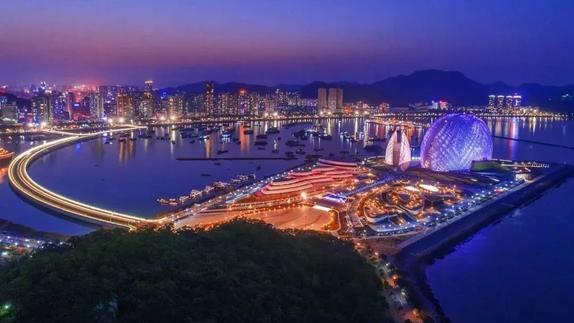 This undated photo shows a night view of Zhuhai, a Guangdong province city in the Guangdong-Hong Kong-Macao Greater Bay Area city cluster. (PHOTO / CHINA DAILY)
This undated photo shows a night view of Zhuhai, a Guangdong province city in the Guangdong-Hong Kong-Macao Greater Bay Area city cluster. (PHOTO / CHINA DAILY)
Hong Kong’s first chief executive Tung Chee-hwa says the city can create a new golden era by playing a more proactive role in the nation’s further opening-up, and deeper integration into the Guangdong-Hong Kong-Macao Greater Bay Area.
Addressing the annual meeting of Our Hong Kong Foundation on Thursday, Tung, founder of the local think tank, said despite the unstable global situation, China will continue to open up and seek collaboration.
Tung Chee-hwa noted that integrating with the Bay Area’s development will not impair Hong Kong’s unique advantages, instead it will offer the SAR much broader development room
As the world is still living in the shadow of the novel coronavirus, China has taken the lead to control the pandemic domestically, and is expected to be the only major economy to achieve economic growth this year, noted Tung, who is also vice-chairman of the Chinese People’s Political Consultative Conference National Committee.
ALSO READ: GBA seen as 'test bed' for new ideas, designs
Amid such a backdrop, Tung hopes Hong Kong, the most open city in the nation, will play a more proactive role in China’s “dual circulation” strategy, which emphasizes the boosting of domestic trade, and the connection between domestic and overseas markets.
Tung also sees Hong Kong’s deeper integration into another national strategy – developing the 11-city cluster of the Guangdong-Hong Kong-Macao Greater Bay Area into an international inno-tech powerhouse.
He noted that integrating with the Bay Area’s development will not impair Hong Kong’s unique advantages, instead it will offer the SAR much broader development room.
READ MORE: 3-pronged approach seen for HK footprint in GBA plan
Last year, the GDP of the Bay Area, which comprises the Hong Kong and Macao special administrative regions and nine cities in Guangdong province, including Shenzhen and Guangzhou, surpassed US$1,600 billion, eclipsing that of South Korea.
Tung says he hopes Hong Kong youths will realize the huge potential of the region and actively explore development opportunities there.


